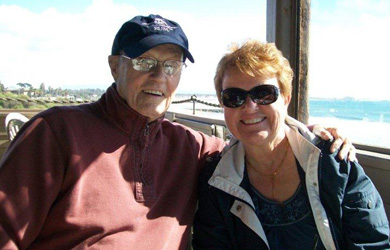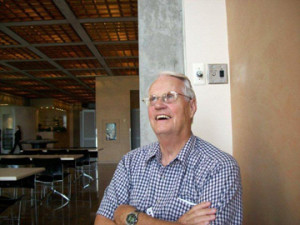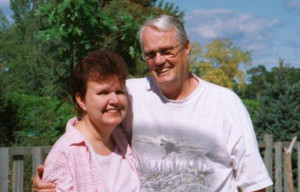
Caregiver / Volunteer Profile: Carol Holmes-Kerr
April is an important month for both caregivers and volunteers as we celebrate both National Caregiver Day and Volunteer Week. We caught up with Carol Holmes-Kerr, who shared her experience as a caregiver, as well as a volunteer. Carol, a retired nurse and counsellor, tells us more about how her life changed after her husband, Jim, was diagnosed with Alzheimer’s in 2008.
 She also spoke with us about her involvement in forming Mind the Gap, a grassroots group of women who work to make it easier to find support services in the community. Her involvement has helped her to deal with Jim’s death and take control over a disease that ruled so much of their lives.
She also spoke with us about her involvement in forming Mind the Gap, a grassroots group of women who work to make it easier to find support services in the community. Her involvement has helped her to deal with Jim’s death and take control over a disease that ruled so much of their lives.
Jim’s diagnosis
My husband, Jim, was diagnosed at age 75 with Alzheimer’s disease in 2008; however, I know that his dementia started well before that. In retrospect I can see signs dating as far back as 2000. My first response was to explain away his behaviours or ignore them. When he couldn’t do the things with which he had been so familiar and he was having significant short term memory loss, I questioned whether he was developing dementia. His mother and his grandmother both died with dementia.
I can’t remember how I decided to see someone at the local Alzheimer Society (AS), but that’s what I did. I half expected her to tell me I had gone to the wrong place when I explained our situation, but she confirmed my fears and advised me to start documenting my observations and to make an appointment for assessment with our doctor.
He was diagnosed Alzheimer’s disease and was in the early stage, but it was progressing to the point where I realized it was not safe for him to drive any longer. He would get lost and could not cope with traffic. Because we lived in the country, we needed to drive everywhere we went. I could see that his dementia was getting worse and that I would eventually need help, so we decided to move back to Ottawa to be closer to good friends, my sister and two of Jim’s sons.
How life changed after becoming a caregiver
When we decided to move back to Ottawa, my life revolved around caregiving for Jim. I had been working in private practice as a counsellor until then, but had to close my office and essentially retire.
Socially, we continued to spend time with close friends and family, who were understanding of his odd behaviours. Social outings such as going to concerts and theatre became fewer and fewer as Jim would behave inappropriately or become impatient or irritable.
Financially, we managed well until Jim was admitted to long term care (LTC) in April 2012. At that time I began borrowing from our line of credit and investments to pay the monthly LTC fee until Jim passed away from a heart attack in January 2013.
Coping with the challenges of caregiving
The most challenging part of being a caregiver was remaining patient while dealing with day to day issues on my own. Throughout the time I took care of my husband I had to deal with the sadness of watching the love of my life slip away, little by little.
Some people stopped contacting us and that was disappointing. Joining support groups provided by the local AS gave me an opportunity to share these feelings with others in the same situation. I found a day program for Jim so I could continue to have some time to pursue my hobby and also took him to the Guest House for respite periods.
Volunteering with the Alzheimer Society

I knew about the Alzheimer Society through the volunteer work that Jim did during the 1990’s after he retired. He volunteered for several years at the Day Away program in Ottawa that he eventually attended as a client. He also volunteered at an adult day program in Petrolia when we lived in Southwestern Ontario. It was almost like I knew intuitively where to go for help when I could no longer explain away Jim’s dementia.
I have been attending an AS support group for wives for almost 4 years now. It gives me an opportunity to offer emotional support to others who are walking the same path as I. I have also participated in the local Walk for Memories to raise money for the Alzheimer Society and intend to continue to do so annually.
I also help my local Alzheimer Society and the Alzheimer Society of Canada by doing media interviews to promote their message about living with dementia. I appeared on television in January to talk about our experience with stigma around my husband’s dementia. Jim and I also participated in the video No Thanks, We’re Fine: Supporting Families Living with Dementia that was produced by our local Alzheimer Society.
My involvement with Mind the Gap
I also am part of a grassroots group of four wives, called Mind the Gap, founded six months ago. We have met with provincial politicians and agencies that provide services for people with dementia in the community, in the future we hope to meet with federal politicians as well. The group emerged from the wives support group after we became increasingly aware that we were getting conflicting and confusing information from community support services. We advocate for caregivers who want to keep their loved ones with dementia home as long as possible and we put a human face to the Alzheimer Society’s dementia initiative.
With Mind the Gap, I share the experiences Jim and I had with the challenges of navigating the system of community support. I work with the other women to present our ideas and requests in a clear and understandable way to organizations that provide services and funding. We work to support the vision and goals of the Alzheimer Society.
What I’ve learned since becoming a volunteer
The main thing I learned is how enriching and empowering it is to do volunteer work, especially while facing a disease that takes so much away and can leave people feel helpless to do anything about it.
I have also learned that we have a system of community resources that is not perfect, but most of the CEOs and politicians we visited were willing to listen to suggestions for change.
In the support groups that I attended, I learned that it is so important not to try to carry the load alone, that there are others who truly understand and that it’s okay to cry and laugh together about some of our experiences.
I think the main challenge was finding the time to do the volunteer work while also caring for my husband until he was admitted to LTC. It was also a risk to talk publicly about Jim’s dementia but I found people quite accepting and understanding.
Helping others has given some meaning to Jim’s and my experience with dementia. Meeting others who are travelling the same road and sharing the load with them has taught me skills and patience.
My advice for someone considering volunteering

Do it! As I said above, volunteering is enriching and empowering. Dementia takes so much away and can leave us feeling helpless to do anything about it. This is a wonderful way to fight back, helping not only yourself but others in the process.